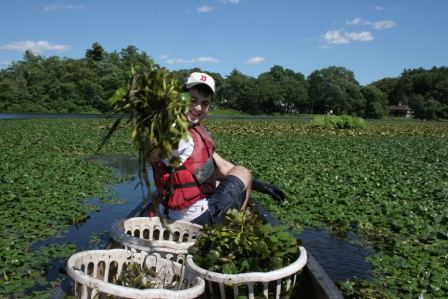Water Chestnut Invasion at Audubon Sanctuary
Please Help Us keep It from Spreading!!
There is a new invasive aquatic weed in the Conewango Creek watershed: Water Chestnut.
Description
Water Chestnut is a rooted, aquatic plant with both floating and submersed leaves. The floating leaves form a rosette and are green, glossy and triangular with toothed edges. The submersed leaves are feathery, and are found whorled around the stem. Plant stems are cord-like and can attain lengths of up to 16 feet. Water chestnut is an annual plant, overwintering entirely by seed. In July the plant begins to produce seeds (called nuts) with 4 sharp spines. Mature seeds are green to greenish brown and sink to the bottom. Seeds may remain alive in the sediment for up to 12 years! Floating black nuts will not sprout. (Please note: this plant species is not the same as the “water chestnut” used in Asian cooking.)
Audubon’s Plan
Since Audubon Sanctuary is currently the only know infestation in the Conewango Watershed, a plan has been developed to eradicate it before it spreads to any other place in the watershed. A series of plant “Pulls” are scheduled. Volunteers will manually remove all the plants they can before that go to seed. Each plant produces a dark nut or nutlet underneath. The object is to prevent the plants from seeding and pulling them out entirely. Since the nuts can remain alive and able to grow for up to 12 years, preventing further seed from forming is a priority. CCWA fully supports Audubons efforts to eradicate this weed.
CCWA Members on Call
CCWA members are coming together as a group to show support and solidariety for Audubon in this effort. It’s going to take a lot of effort, but in helping control the weeds at Audubon we hope to stop or at least slow the spread of this aggressive weed throughout the Conewango watershed.
CCWA Member Pulls are scheduled:
Wednesday 24th and, Wednesday 31st from 5-8pm at Audubon. The conditions are changing a bit on the pond based on rainfall and plant growth so flexibility will be needed. But you can count on close toed shoes and long pants. Perhaps muck boots, waders and lifejackets.
Please signup with Audubon by emailing rlundin@jamestownaudubon.org or calling them at (716)569-2345. You can also get information from their Website: www.jamestownaudubon.org
